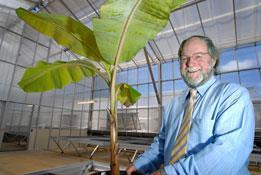
Scientists in the Australian state of Queensland have developed a banana strain resistant to Fusarium wilt, also known as Panama disease, and have carried out successful glasshouse trials, according to the ABC.
Fusarium wilt has threatened banana plantations across northern Australia and parts of Asia, and devastated the banana industry in the 1950s. The industry is concerned the fungus will spread.
Tony Heidrich from the Australian Banana Growers Council says the threat level from Fusarium wilt is extreme.
“Well in a word, I suppose, diabolical,” he said. “It would quickly decimate all of the plantations in the area where the outbreak occurred.”
The new banana strain was developed by scientists at the Queensland University of Technology. Professor James Dale is one of the lead scientists from the team.
“We took both Cavendish and Lady Finger and we inserted a single gene for this resistance into the banana genome. The gene inhibits the cell from dying when it's attacked,” Professor Dale said.
“Fusarium wilt is one of the most devastating diseases of bananas worldwide and it’s increasing in threat worldwide. There isn't really any control for that disease except resistance.”
“Once the soil becomes infested with the fungus it’s virtually impossible to get rid of,” he warned.
Successful trials have been conducted in a glasshouse already, and a field trial in north Queensland is scheduled for December.
“The glasshouse test that we did is a very, very severe test, much more severe than we believe actually occurs in the field,” said Professor Dale.
“So we believe that the resistance we’ve generated in the glasshouse will certainly transfer through to the field.”
The Queensland University of Technology team is also investigating increasing the nutritional value of bananas using the same technology, hopefully for use in developing countries where bananas are a staple food.



